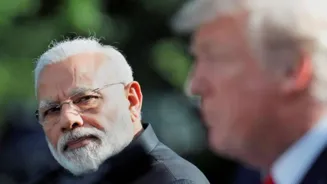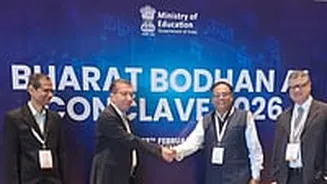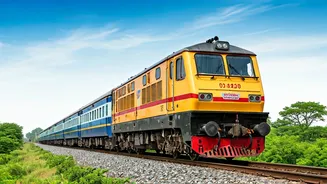US President Donald Trump has once again lashed out at India over trade practices, branding it the “most tariffed nation” in the world and accusing New
Delhi of maintaining a “totally one-sided” relationship with Washington. Speaking on The Scott Jennings Radio Show, Trump reiterated his long-standing claim that India has now offered a “no tariff” deal, though he warned that the offer might be “too late.” Trump, who has made tariffs a central theme of his economic and foreign policy, defended his decision to impose a steep 50 per cent tariff on Indian goods entering the US. “China kills us with tariffs, India kills us with tariffs, Brazil kills us with tariffs. I’ve understood tariffs better than they did; I understood tariffs better than any human beings in the world,” he remarked. “India was the most highly tariffed nation in the world… and you know what, they’ve offered me no tariffs in India anymore. No tariffs. If I didn’t have tariffs, they would never make that offer. So you have to have tariffs.” The former businessman-turned-president claimed that the US has historically done “very little business” with India, while New Delhi has sold “massive amounts of goods” to America, making Washington its largest client. On his social media platform Truth Social, Trump described the relationship as a “one-sided disaster” spanning decades. He argued that US companies had been unable to expand in India because of what he called “the highest tariffs of any country,” and criticised India’s heavy reliance on Russian oil and defence imports instead of sourcing more from the United States. The controversial remarks come even as a US appeals court recently ruled that Trump’s 50 per cent tariffs on Indian imports were unlawful, sparking debate within American political and business circles. Several lawmakers have argued that the tariffs risk hurting US consumers and manufacturers rather than balancing trade. Meanwhile, India’s top exports to the US, including textiles, gems, pharmaceuticals, and machinery, have all faced significant duties under Trump’s policy. In India, officials have maintained that trade negotiations are ongoing. Commerce minister Piyush Goyal recently said that both sides remain in dialogue to resolve the tariff dispute, though Washington has kept the 50 per cent duties in place. Analysts suggest that Trump’s combative rhetoric may be aimed as much at a domestic political audience as at New Delhi, framing his tariffs as a tool of “tough bargaining.” The criticism of Trump’s India policy has not been limited to trade. Former US National Security Advisor Jake Sullivan has accused Trump of weakening America’s long-term strategic ties with India while pivoting closer to Pakistan due to commercial interests. Sullivan, who served under President Joe Biden, said the US had spent decades nurturing relations with India in areas such as technology, talent and security cooperation against China, but Trump’s approach has “jeopardised” that foundation. He also warned that allies like Germany and Japan may now question Washington’s reliability as a partner. As tensions rise, the India-US trade dispute is increasingly being viewed as a test of whether the world’s largest democracy and the world’s biggest economy can sustain their strategic partnership despite economic frictions. For now, New Delhi appears to be signalling willingness to reduce tariffs, but whether that will satisfy Trump’s demands remains uncertain.














